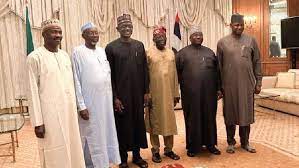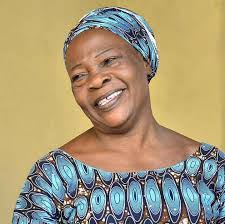As diplomatic endeavors persist, mounting pressure confronts the faction that has seized power in neighboring Niger Republic. On Sunday night, President Bola Tinubu convened a meeting with five northern governors whose states share borders with the nation wracked by the recent coup.
The meeting formed part of the President’s consultations regarding the situation in the Niger Republic.
The governors, who convened with the President at Aso Rock, included Ahmed Aliyu (Sokoto), Umar Namadi (Jigawa), Mai Mala Buni (Yobe), Idris Nasir (Kebbi), and Dr. Dikko Radda (Katsina).
While the specifics of the discussion held at the State House in Abuja were not disclosed publicly, it coincided with the imposition of a border ban on Niger Republic by the Economic Community of West African States (ECOWAS) and other member states.
ECOWAS, led by Tinubu, had issued a military action ultimatum against Niger Republic, which reached its expiration on Sunday.
Former colonial power France, which saw its military ties with the junta severed after their takeover on July 26, has announced its resolute support for whatever action ECOWAS chooses to take as the Sunday deadline passes.
In a statement, the office of French Foreign Minister Catherine Colonna emphasized the critical importance of Niger’s future and the stability of the entire region. This sentiment was underscored following her discussions with Niger’s Prime Minister, Ouhoumoudou Mahamadou, in Paris.
The ECOWAS military chiefs of staff have collaboratively devised a comprehensive plan for a potential intervention, aiming to address the ongoing crisis. This junta-led coup marks the latest in a series of coups that have shaken the Sahel region of Africa since 2020.
Speaking on Friday, ECOWAS Commissioner Abdel-Fatau Musah expressed the organization’s strong desire for diplomatic resolutions. He emphasized the urgency of conveying a clear message to the junta, indicating that ample opportunities are being provided for them to reconsider and reverse their actions.
However, he cautioned that all the components required for any potential intervention have been thoroughly planned, outlining the specifics of how and when military force would be deployed.
Niger has played a pivotal role in Western strategies aimed at countering jihadist insurgencies that have afflicted the Sahel region since 2012. Both France and the United States have stationed approximately 1,500 and 1,000 troops in the country, respectively, as part of these efforts.
Nonetheless, there is a growing surge in anti-French sentiment within the region, coinciding with an escalation in Russian activity, often facilitated by the Wagner mercenary group. Moscow has expressed opposition to any external armed intervention in Niger.
– ‘Judgmental Oversight’ – The coup “represents a significant error in judgment that fundamentally contradicts the best interests of the nation,” emphasized Sebastien Lecornu, the French Minister of the Armed Forces, during an interview with AFP on Saturday.
“This coup attempt threatens to undermine the counterterrorism efforts in the Sahel region, where armed terrorist groups have been regaining strength, often exploiting the vulnerabilities of struggling states like Mali,” he asserted.
Niger, one of the world’s most impoverished nations, heavily relies on foreign aid, which could be at risk if President Mohamed Bazoum isn’t reinstated as the head of state, he emphasized.
The junta has declared its readiness to respond with force.
Algerian President Abdelmadjid Tebboune voiced his opposition to any potential military intervention in neighboring Niger.
“We firmly reject the idea of military intervention,” he stated during a televised interview on Saturday evening, highlighting that such actions would directly endanger Algeria’s security.
He emphasized, “A viable solution cannot be achieved without our active involvement. We bear the brunt of the consequences.”
“Algeria shares an extensive border, nearly a thousand kilometers long, with Niger,” he noted.
He posed the question, “What have been the outcomes in nations that have witnessed military interventions?” as he pointed to examples like Libya and Syria.
Mali and Burkina Faso, countries where military juntas have taken control since 2020, have also strongly cautioned that any regional intervention would be akin to a “declaration of war” against them.
Bazoum, aged 63, along with his family, has been held captive by the coup plotters in his official residence in Niamey since July 26.
In a recent op-ed published in The Washington Post, Bazoum, in his first extended statement since his detention, warned that a successful coup would “inflict catastrophic consequences on our nation, the region, and the global community.”
Bazoum, who secured victory in the 2021 elections, marking Niger’s first peaceful transfer of power from one civilian government to another, implored the “U.S. government and the entire international community to assist us in reinstating our constitutional order.”
– Opposition in Nigeria – Nigeria has halted electricity supplies to Niger, heightening concerns for the humanitarian crisis. Meanwhile, Niamey has sealed its borders, creating complications for food deliveries within the vast Sahel nation.
Prominent Nigerian politicians are urging President Bola Tinubu to reconsider any potential military intervention.
“The Senate calls upon the President of Nigeria, who also chairs ECOWAS, to encourage other ECOWAS leaders to prioritize political and diplomatic strategies,” said Senate President Godswill Akpabio.
Senators from northern Nigerian states, seven of which share a combined border of approximately 1,500 kilometers (900 miles) with Niger, have advised against intervention until all diplomatic avenues have been exhausted.
Tinubu himself urged ECOWAS on Thursday to take “all necessary measures” to achieve a peaceful resolution to the crisis in Niger.




